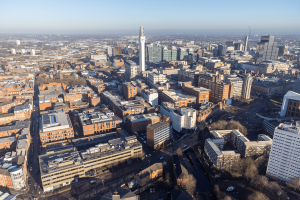Interest rates hit five per cent for first time since 2008

The Bank of England has increased interest rates to five per cent for the first time since 2008.
The rise of 0.5 per cent was the 13th increase in a row and came as something of a shock with many commentators predicting a hike of 0.25 per cent.
The increase in the interest rate will lead to added pressure on household incomes and businesses across the UK.
The Bank’s monetary policy committee was split over the decision to hike UK interest rate by half a percentage point.
Seven members voted in favour of the proposition and two against.
The Bank is hoping that tightening monetary policy will squeeze rising price pressures out of the system.
On Wednesday it emerged that inflation failed to fall as had been hoped in May, with the annual rate remaining stuck at 8.7 per cent – well over the UK’s two per cent target. Reducing inflation is one of the key aims of the current government.
The lack of movement in the inflation figure added pressure on the Bank to act decisively.
The Bank of England has warned in its note accompanying the decision further increases may be necessary.
The notes said: “The MPC will continue to monitor closely indications of persistent inflationary pressures in the economy as a whole, including the tightness of labour market conditions and the behaviour of wage growth and services price inflation. If there were to be evidence of more persistent pressures, then further tightening in monetary policy would be required.
“The MPC will adjust Bank Rate as necessary to return inflation to the two per cent target sustainably in the medium term, in line with its remit.”
Chancellor of the Exchequer Jeremy Hunt backed today’s decision.
He said: “High inflation is a destabilising force eating into pay cheques and slowing growth. Core inflation is higher in 14 EU countries and interest rates are rising around the world, but the lesson from other countries is that if you stick to your guns, you bring inflation down.
“Our resolve to do this is watertight because it is the only long-term way to relieve pressure on families with mortgages. If we don’t act now, it will be worse later.”
Mike Randall, CEO of Simply Asset Finance said: “While this will certainly strike a chord with firms across the country, we’re seeing resilient business owners are already factoring this into their future operations.
“We know many small firms are already taking the opportunity to adapt their business models to counteract rising rates, but it’s vital they don’t put future investment decisions on hold. With small businesses accounting for 99 per cent of the UK business population, and economic growth far below expectations, their success will be closely tied to future recovery.”
“It will take more than surging interest rates to slow SMEs down, but business leaders needn’t run the race alone. With the SME funding gap continuing to grow, the fact remains that SMEs need access to prompt and efficient specialist finance in order to keep the impact of future rate increases at arm’s length.”
George Lagarias, chief economist at Mazars comments: “A double rate hike was appropriate following yesterday’s bad inflation number.Unfortunately, from where we are today, there aren’t many good options. The UK is in a vicious inflation cycle plain and simple.
£Unless demand is decisively curtailed, there’s a real danger that inflation will get out of hand. Make no mistake, this means significant pain for consumers. The government could step up to alleviate pressures in the labour market and increase housing availability, which should help diffuse the inflation bomb faster. Presently, markets are discounting four more rate hikes, a one percent higher rate by the end of the year.”









